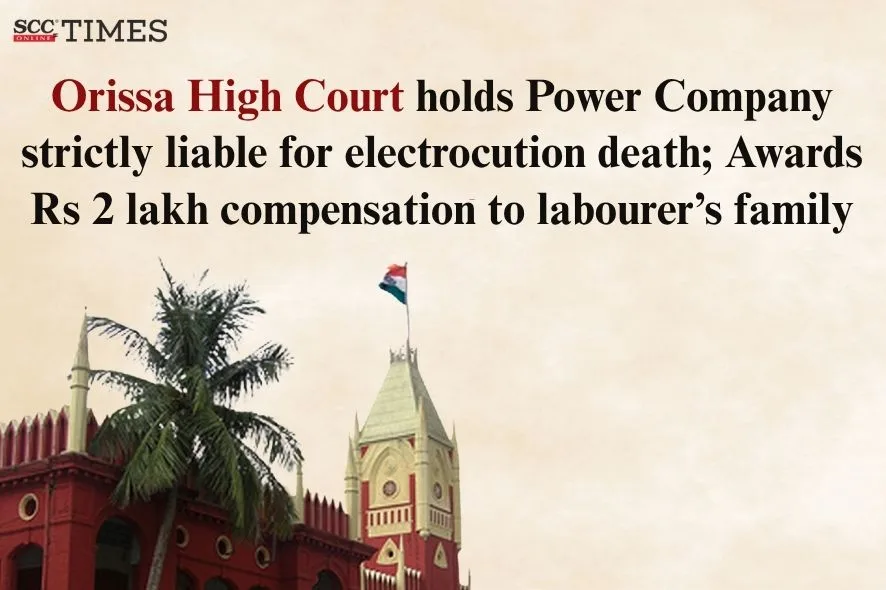Orissa High Court: In a petition filed by the wife and two sons of the deceased, seeking compensation for his death caused by electrocution, allegedly due to the negligence of the Electricity Distribution Company (‘Distribution Company’), a Single Judge Bench of A.K. Mohapatra, J., while allowing the petition, held that the Distribution Company had a statutory duty to distribute and supply electricity in the locality. Applying the principle of strict liability, the Court concluded that the company was strictly liable for the death of the deceased and, therefore, responsible for compensating the deceased’s family
Background:
The deceased, a labourer of 54 years of age, was electrocuted on 06-07-2007 when he unknowingly came in contact with a puddle of water which was charged with electricity because a live L.T. line wire had snapped and had fallen into the puddle of water on the road. Despite being rescued and hospitalised by the villagers, he succumbed to his injuries on the same evening.
Subsequently an FIR was registered, inquest and post-mortem were conducted, and ASI’s final report were submitted, confirming death caused due to electrocution because of snapping of live electric L.T. lines. The petitioners, i.e. the wife and the sons, contended that the death of the deceased was caused due to the negligence of the Distribution Company’s failure to discharge their duty of properly maintaining the L.T. electric wires in Sergarh village, Balasore, despite several complaints and requests by the residents of the village.
The petitioners argued that the deceased being the sole earning member of the family, his death had not only caused emotional pain and agony to them but also grave financial hardship, therefore sought compensation of Rs 2 lakh with 12 per cent interest per annum.
Additionally, it was highlighted by the petitioners that the Distribution Company by admitting their negligence and liability had initially paid a sum of Rs 10,000 to perform last rites of the deceased and had assured them to pay a just and proper compensation later but did not take any steps in this regard, despite receiving a legal notice from the petitioners. They also referred to the OERC (Compensation to Victims of Electrical Accidents) Regulation, 2020 (‘2020 Regulations’), to substantiate their claim.
Analysis and Decision:
The Court analysed the principle of strict liability under the law of tort in Ryland v. Fletcher, [L.R.] 3 H.L. 330, wherein it was held that the person who, for his own purpose, brought on his land and collected and kept there anything likely to do mischief if it escaped, must keep it at his peril, and if he did so he was prima facie answerable for all the damage which was the natural consequence of its escape. The Court observed that the rule of strict liability essentially attached the liability on the undertakers of the hazardous activities, to compensate for damages caused, irrespective of any carelessness on their part. The Court noted that the basis of liability was the foreseeable risk inherent in the very nature of the activities.
The Court relied on M.P. Electricity Board v. Shail Kumari, (2002) 2 SCC 162, holding that if transmitted energy caused injury or death to a person unknowingly trapped, the supplier was primarily liable to compensate. The Court also referred to Dusmanta Samal v. State of Orissa, 2025 SCC OnLine Ori 1126, observing that the opposite parties were engaged in a hazardous activity and strictly liable for the loss of life. Though human life could not be restored, the bereaved family could be compensated monetarily for the loss of income due to the untimely death of a young member.
The Court emphasised that the Distribution Company had the statutory responsibility of distribution and supply of electricity in the locality, therefore the Court was of the considered view that by application of the principle of strict liability, the Distribution Company were strictly liable for the death of deceased and were liable to pay compensation to the petitioners. The Court further observed that the Distribution Company had not filed any counter affidavit despite given several opportunities by the Court to deny the averments made, leading to an implied admission under the doctrine of non-traverse.
The Court, while allowing the petition and deciding the quantum of compensation, observed that the 2020 Regulations, though not applicable retrospectively, fixed the interim compensation at Rs 2 lakhs, with interest at 8 per cent from the date of the incident, increasing to 12 per cent if delayed beyond two months. The Court further granted liberty to the petitioners to pursue other suitable remedies in the common law forum for higher compensation.
[Umamani Nayak v. TPNODL, 2025 SCC OnLine Ori 2928, decided on 28-07-2025]
Advocates who appeared in this case:
For the Petitioners: Bijay Kumar Mohanty, Advocate
For the Opposite Parties: L.K. Moharana, Advocate for TPNODL, P.K. Mohanty, Senior Advocate along with P. Mohanty, Advocate


